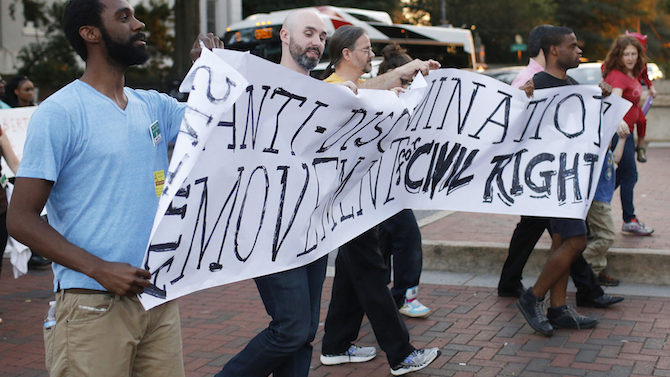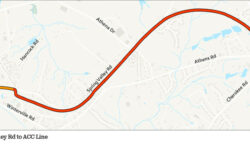Since shortly after the General Beauregard’s drink scandal in 2015, the Athens Anti-Discrimination Movement and allied groups have been agitating for a local civil rights committee to deal with accusations of discrimination, not just at downtown bars, but all over the city.
Last fall, after a contentious debate, the ACC Commission passed an ordinance outlawing discrimination at bars and directed staff to study the feasibility of such a civil rights committee. A report recently released by Manager Blaine Williams concludes that state law puts the kibosh on such a committee—at least one with any teeth. Taxis and alcohol are the only areas where local governments in Georgia are allowed to regulate businesses; a broader anti-discrimination ordinance would violate the state constitution, according to ACC Attorney Bill Berryman. And there is no court that’s authorized to try civil (as opposed to criminal) violations of local ordinances. Even a committee that merely serves as a forum to air grievances could open the county up to charges of defamation, Berryman wrote.
Williams interviewed members of local minority communities and consulted studies on discrimination and its effects. (Interestingly enough, attitudes differ by age: Older African Americans believe integration destroyed black culture and commerce, those in middle age see discrimination as personal rather than structural, and younger African Americans describe it almost entirely as a downtown phenomenon.) In addition to anecdotes about being ignored at retail stores, stared at in restaurants and passed over for promotions, here are a few statistics:
• In Athens, 50 percent of African Americans, 42 percent of Latinos and 30 percent of whites are below the poverty line.
• The unemployment rate is 9.2 percent for African Americans and 5.6 percent for whites.
• African Americans make up just 3 percent of senior-level management at local businesses.
• The median household income is $22,342 for African Americans, $32,444 for Latinos and $36,210 for whites.
• A child born into a family at the bottom 10 percent of income ($16,000 or less) has a one in 25 chance of rising to the top 20 percent.
• Of the 705 children the Clarke County School District knows are homeless, 75 percent are black.
Williams also studied how other communities dealt with the problem. In Knoxville, TN, the chamber of commerce provided diversity training to CEOs and matched them as mentors with black high-school students. Decatur’s plan focused more on government services, such as policing, affordable housing and transit. Beaverton, OR, noticed a demographic shift and made an effort to include underserved communities.
“There is a need for a thorough and frank assessment of the impact of discrimination in the community and its connection with equity and socio-economic issues,” Williams concluded. He recommended a task force to write a Diversity, Equity and Inclusion Plan.
Friday, Mayor Nancy Denson announced the makeup of that task force. Chaired by Grady Martin, the task force will also include AADM co-founder Mokah Jasmine Johnson, Mount Pleasant Baptist Church pastor Abraham Mosely, Al-Huda Islamic Center imam Adel Amer, Athens Black History Bowl founder Fred Smith, immigration activist Beto Mendoza, Piedmont Athens Regional executive Robert Finch, Terris Thomas of Family Connection/Communities in Schools, barber Chris Sheats, financial advisor Michelle Pearson and Cornerstone Church pastor Scott Shepherd. The appointments lean heavily toward African Americans and have been criticized on social media for not including any LGBT members.
The task force will work with the ACC Housing and Community Development Department with a $50,000 budget and finish its work no later than Aug. 1, 2018.
Johnson—who wrote a column for Flagpole about how she envisions a local civil rights committee taking shape—said she is pleased with Williams’ report, but skeptical of whether the county government will actually form such a committee, and she questions how much more research really needs to be done.
“In my opinion, they tried to avoid this issue, and If it wasn’t for all of the marches and protest, I don’t believe we would have gotten this far,” Johnson said. “So with that being said, I do not have much faith in our local government. I still have issues with the dress code signage and bars having a option to hide behind not posting a sign. They haven’t even enforced some of the things they already have in place, such as making sure the bars are abiding by the new rules, which will deter some of this cocky discriminatory behavior. Most of the general public and new students don’t even know that the anti-discrimination ordinance exists or how to use it if discriminated against, so how can I trust their true intentions?”
Like what you just read? Support Flagpole by making a donation today. Every dollar you give helps fund our ongoing mission to provide Athens with quality, independent journalism.










